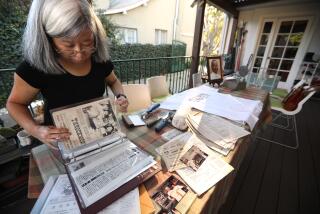Karcher Rides Off in His ’41 Plymouth
It’s tempting to want to proclaim the official end of Carl Karcher’s business life -- which came when he quietly retired recently -- as ending an era in Orange County. Because the burger king is such a seminal figure in local lore, the urge is to say that we won’t see his like again.
We may not.
However, beware of sweeping statements. Surely, someone with an idea, some cockeyed optimism and a hole in his pocket must be convincing himself at this very moment that he sees an opening, can sell a product and can make a million dollars.
And then pull it off.
That’s what Karcher, who came to California from Ohio in a ’36 Ford, was thinking in the 1940s and ‘50s -- a period now so prehistory that it is the stuff of newsreel footage and faded memory.
But it was a time when big ideas could be writ large onto empty local canvasses. And by the time the 1960s had come and gone, Karcher was a fixture on the scene, having parlayed a hot dog stand in Los Angeles that he bought for $326 into the Carl’s Jr. franchise and then into a fast-food enterprise that now reports sales of $455 million.
On June 28 in Irvine, stockholders of the company he founded honored him as he resigned from the board of directors. Now 87, Karcher had been a diminished presence at the company in recent years but is forever etched into the post-World War II landscape of Southern California.
Legend has it -- or is it the truth? -- that Karcher did first-day business of $15.50 with the hot dog stand he and his wife bought in 1941, using their Plymouth for collateral. In 1950, he opened the first two Carl’s Jr. restaurants -- in Anaheim and Brea.
But rather than being the anonymous founder of a company, Karcher and his growing chain came to be identified as part and parcel of the exploding local scene.
“The world in which Carl’s Jr. blossomed was the immediate post-World War II world,” says D.J. Waldie, author of “Holy Land: A Suburban Memoir.” Written about his hometown of Lakewood, Waldie’s book serves as a guide for the population boom that redefined the fates of Los Angeles and Orange County.
In a sense, Waldie says, the entrepreneurs who built businesses in conjunction with that boom were lucky to be here at the right time. But that doesn’t tell their whole story, he says. “There was something about the men and women who had gone through the difficulty of the Depression years and the terrors, really, of the war years who, having survived that, found themselves in the post-war period to have large dreams to achieve and a sense of determination to do that.”
In contrast to today’s fast-food restaurant scene run by anonymous moguls, Waldie, now 55, was well aware as a teenager that Carl Karcher was Carl’s Jr.
“He was one of those names that seemed to loom more largely than other names in the business world of Southern California when I was a young man,” Waldie says.
“There was a time in Southern California when local businesses had the true romantic aura about them,” he says. “You patronized them because they were local. There was a certain California chauvinism, if you will.... As a teenager, I think I understood there was a huge enterprise underway in Southern California and we were all part of that enterprise that involved building the place where we lived.”
From our modern-day vantage point, there’s no disputing that Carl Karcher was one of those builders. Yes, his was an empire built on hamburgers, but it’s still standing.
Everything comes full circle.
So it was that when his company honored him last month, they gave their father figure a car: a vintage 1941 Plymouth Super Deluxe -- the same model he and his wife Margaret used to buy the hot dog stand -- back in a time when anything was possible.
Dana Parsons can be reached at (714) 966-7821 or at dana.parsons@latimes.com.
More to Read
Inside the business of entertainment
The Wide Shot brings you news, analysis and insights on everything from streaming wars to production — and what it all means for the future.
You may occasionally receive promotional content from the Los Angeles Times.










